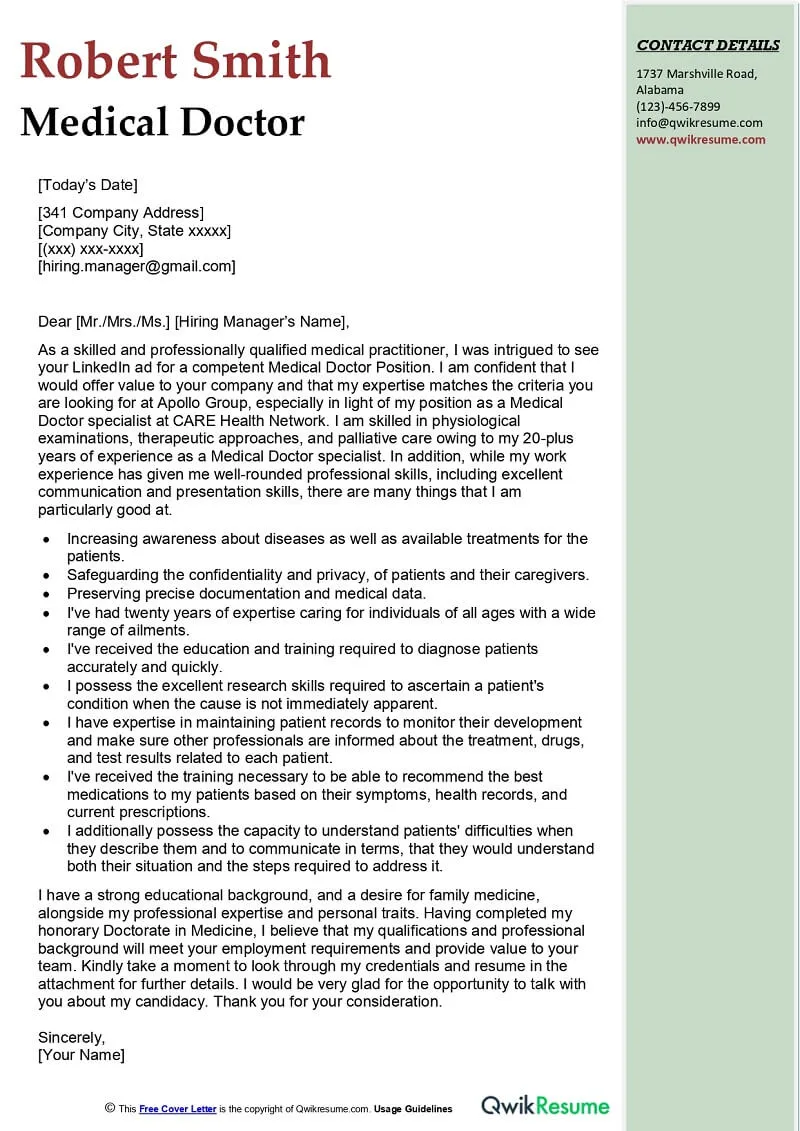Why a Strong Cover Letter is Vital for Doctors
In the competitive world of medicine, a well-crafted cover letter can be the key to unlocking your dream job. It is more than just a formality; it’s your first opportunity to make a lasting impression on potential employers. A strong cover letter serves as a concise introduction to your qualifications, skills, and personality, providing a glimpse into what makes you the ideal candidate. It complements your resume by offering context, explaining your career goals, and illustrating how your experience aligns with the specific requirements of the position. In many cases, a cover letter is the initial document a hiring manager reviews, so it must be persuasive and compelling from the start. A lackluster cover letter can lead to your application being overlooked, regardless of your experience or qualifications. Therefore, investing time and effort in creating a standout cover letter is an investment in your future career prospects as a doctor. This crucial document allows you to differentiate yourself from other applicants by highlighting your unique strengths and demonstrating your genuine interest in the role and the institution.
Highlighting Your Qualifications and Skills
Your cover letter is the ideal space to showcase your qualifications and skills. While your resume provides a detailed list of your experiences and credentials, the cover letter gives you the opportunity to explain their relevance and significance. Start by clearly stating your medical specialty and any subspecialties. Then, highlight key skills, such as diagnostic abilities, surgical expertise, patient communication, and leadership capabilities. Give concrete examples of how you have utilized these skills in previous roles. For instance, describe a challenging case you successfully managed, a research project you contributed to, or an initiative you spearheaded to improve patient care. Tailor this section to match the specific requirements outlined in the job description. If the position emphasizes a particular skill or experience, make sure to emphasize your relevant qualifications. Do not just list your accomplishments; demonstrate them. Use action verbs to describe your experiences and quantify your achievements whenever possible. For example, instead of saying you “managed patients”, you could say you “managed a caseload of 50+ patients daily, ensuring comprehensive care.”
Tailoring Your Cover Letter to the Job
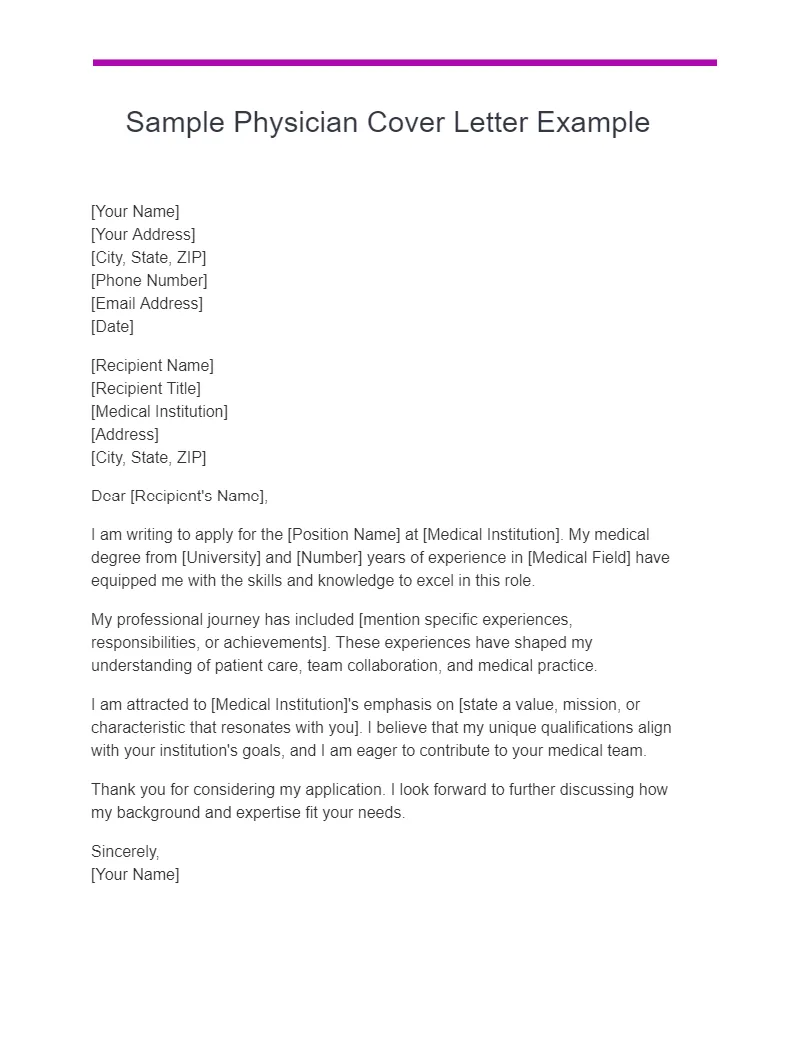
One of the most critical steps in writing a successful cover letter is tailoring it to the specific job you are applying for. Generic cover letters are easily recognized and often discarded. Take the time to carefully review the job description and identify the key requirements, responsibilities, and desired qualities. Then, adjust your cover letter to align with these specific needs. Highlight the experiences, skills, and qualifications that make you a perfect fit for the role. Address each requirement mentioned in the job description, providing examples of how your past experiences demonstrate your ability to meet them. When you tailor your cover letter, you show the hiring manager that you have taken the time to understand the position and that you are genuinely interested in the opportunity. This attention to detail demonstrates your professionalism and your commitment to the application process. Always update your cover letter for each job application, ensuring that you address the unique aspects of each position and employer. This personalized approach greatly increases your chances of getting noticed and securing an interview. Be sure to use keywords from the job description throughout your letter.
Researching the Employer
Before you start writing your cover letter, conduct thorough research on the employer and the healthcare facility. Understanding the organization’s mission, values, culture, and recent achievements will allow you to write a more compelling and targeted letter. Visit the organization’s website, read news articles, and explore their social media profiles. Pay attention to their patient care philosophy, research initiatives, and community involvement. Demonstrating that you understand the organization’s goals and values will impress the hiring manager. In your cover letter, mention specific aspects of the organization that resonate with you and explain why you are excited about the opportunity. Refer to any recent awards, publications, or initiatives the organization has been involved in. Show that you have a genuine interest in joining their team. Researching the employer demonstrates your initiative and commitment, and it allows you to personalize your letter, making it more effective and memorable. If possible, identify the hiring manager and address your letter to them directly, which can further enhance the impact of your application.
Creating a Compelling Opening
The opening paragraph of your cover letter is your first and perhaps only chance to grab the hiring manager’s attention. Make it count. Begin with a strong statement that immediately captures their interest. Avoid generic phrases such as “I am writing to apply for the position of…” Instead, use a more dynamic approach. Consider starting with a brief statement about your passion for medicine or a specific achievement that aligns with the job requirements. Clearly state the position you are applying for and how you learned about it. If you were referred by someone, mention that in your opening paragraph. You might say “I am writing to express my keen interest in the [Position Name] at [Hospital Name], as advertised on [Platform]. My experience in [Specialty] and my commitment to excellence in patient care make me an ideal candidate.” The opening paragraph should be concise, enthusiastic, and focused on making a positive first impression. This sets the tone for the rest of the letter and encourages the reader to continue. Keep the opening paragraph brief and to the point, allowing you to quickly establish your purpose and capture the hiring manager’s interest.
Showcasing Relevant Experience
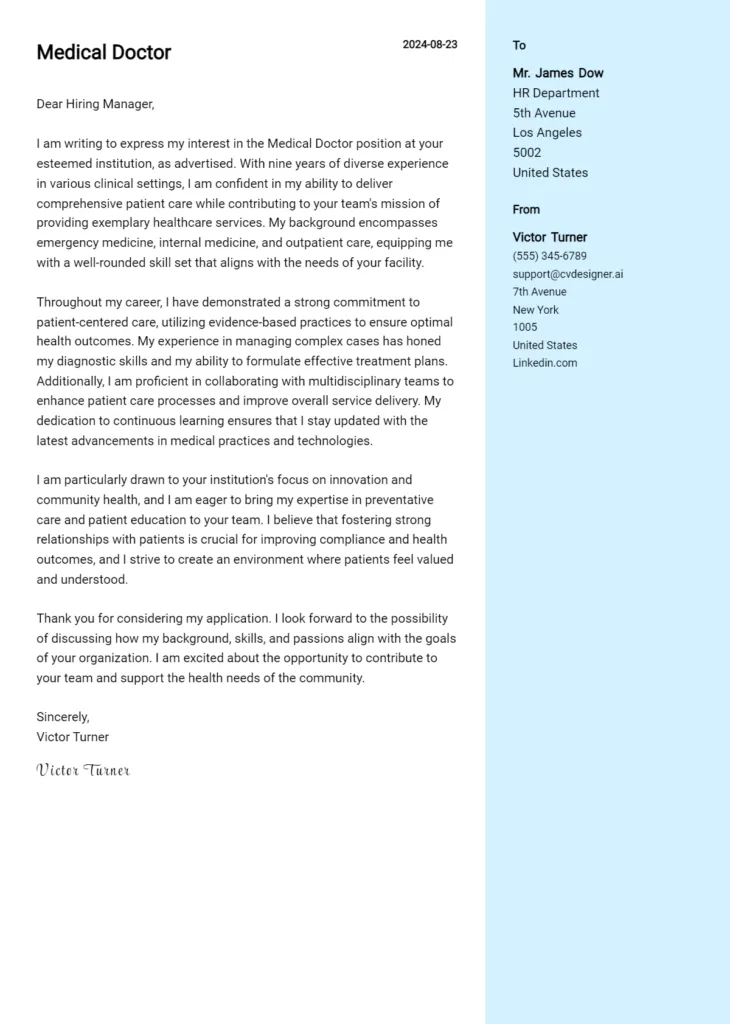
In the body of your cover letter, dedicate a section to showcasing your relevant experience. This is where you connect your qualifications with the requirements of the job. Provide specific examples of your past roles and the responsibilities you held. Use action verbs to describe your accomplishments and skills. Instead of simply listing your duties, explain what you achieved in each role. For example, instead of saying “Provided patient care,” say “Provided comprehensive patient care, resulting in a 15% improvement in patient satisfaction scores.” When discussing your experience, focus on the most relevant aspects of your career. Prioritize experiences that align with the job description. If the position requires experience in a particular specialty or with a specific patient population, make sure to highlight your relevant experiences in detail. Describe your role in any significant projects, research, or initiatives you participated in. Quantify your achievements whenever possible. Use numbers, statistics, and measurable outcomes to demonstrate your impact. This will make your cover letter more persuasive and show that you have the skills and experience the employer is looking for. The goal is to provide clear evidence that you can excel in the role.
Quantifying Achievements
To make your cover letter more impactful, quantify your achievements. Instead of making general statements about your abilities, provide specific metrics that demonstrate your success. Use numbers and statistics to illustrate your accomplishments. For example, instead of saying “Improved patient outcomes,” say “Improved patient outcomes by 20% through the implementation of a new treatment protocol.” Quantifying your achievements provides concrete evidence of your capabilities and makes your cover letter more persuasive. Highlight any instances where you saved the organization time or money, improved efficiency, or increased patient satisfaction. These metrics will make a strong impression on the hiring manager. When quantifying your achievements, be sure to use relevant and accurate data. Use percentages, dollar amounts, and other measurable results to showcase your contributions. Keep your language clear and concise. Your goal is to demonstrate the value you brought to previous roles. Quantifying your achievements makes your cover letter more credible and memorable.
Addressing the Hiring Manager Directly
Whenever possible, address your cover letter to the specific hiring manager or the person responsible for the position. If you know the hiring manager’s name, use it in the salutation. Researching the organization will help you find out who is responsible for hiring. Addressing your letter to a specific person demonstrates that you have taken the time to personalize your application and that you are genuinely interested in the opportunity. If you cannot find the name of the hiring manager, use a general salutation such as “Dear Hiring Committee” or “Dear [Department Name] Team.” Avoid using generic salutations such as “To Whom It May Concern,” as they can make your letter seem impersonal. If you have been referred by someone, mention their name in your cover letter. This can help you gain a personal connection with the hiring manager and increase your chances of getting noticed. However, always ensure you get the referral’s permission before using their name. When addressing the hiring manager directly, tailor your letter to reflect your understanding of their needs. This personal touch shows that you are a serious candidate and that you value the opportunity.
Demonstrating Enthusiasm and Fit
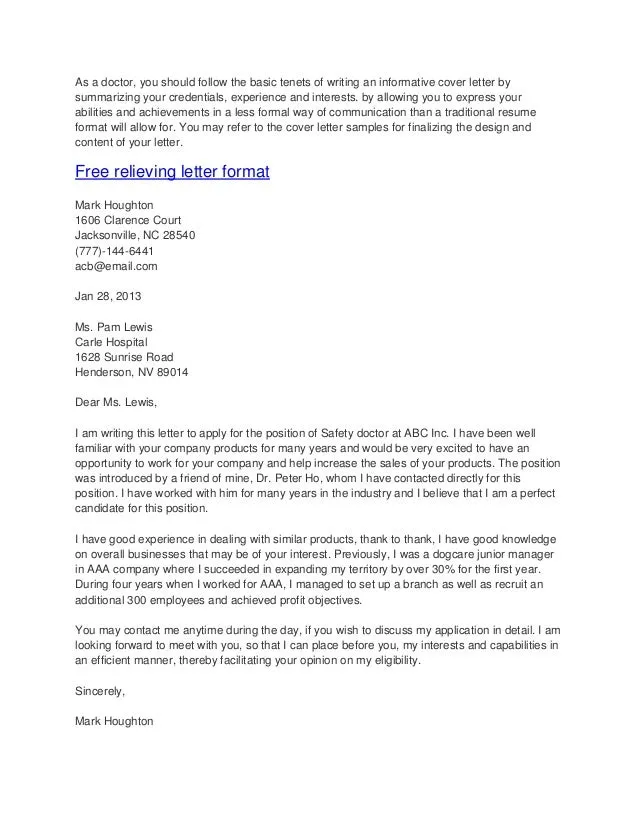
Your cover letter should reflect your enthusiasm for the position and the organization. Demonstrate your passion for medicine and your specific interest in the role. Highlight why you are excited about the opportunity and what you hope to achieve. The hiring manager wants to know that you are genuinely interested in the position. In your cover letter, explain what attracts you to the role and how it aligns with your career goals. Show that you have researched the organization and that you are impressed by their mission, values, and achievements. Express your enthusiasm in a professional and sincere manner. Avoid sounding overly eager or desperate. Instead, use positive and energetic language to convey your interest. For instance, you might say “I am particularly drawn to [Hospital Name]’s commitment to [Specific Initiative], and I am eager to contribute my skills to this mission.” Show how your skills, experience, and values align with the organization’s culture. Demonstrate that you would be a good fit for the team. By demonstrating your enthusiasm and fit, you make the hiring manager more likely to invite you for an interview.
Proofreading and Formatting
Before you submit your cover letter, proofread it carefully. Errors in grammar, spelling, and punctuation can damage your credibility and make a negative impression on the hiring manager. Review your letter multiple times. Read it aloud to catch any mistakes. If possible, ask a friend, mentor, or colleague to review your letter. A fresh pair of eyes can help you spot errors you might have missed. Pay attention to the formatting of your cover letter. Use a professional font, such as Times New Roman or Arial, and maintain consistent spacing and margins. Ensure your letter is easy to read and visually appealing. Divide your letter into clear paragraphs with headings and subheadings to guide the reader. Use bullet points to highlight key information or achievements. Make sure your letter is well-organized and easy to follow. Proofreading and formatting are essential steps in creating a polished and professional cover letter. A well-formatted and error-free cover letter demonstrates your attention to detail and your commitment to excellence.
Using Keywords Strategically
To ensure your cover letter gets noticed by applicant tracking systems (ATS) and hiring managers, use keywords strategically. Review the job description carefully and identify the key skills, qualifications, and requirements mentioned. Incorporate these keywords naturally throughout your cover letter. Use keywords in your opening paragraph, your experience descriptions, and your summary of qualifications. However, do not overdo it or stuff your letter with keywords. The goal is to use them in a way that feels natural and reflects your qualifications. If the job description mentions specific medical software or procedures, be sure to include these in your cover letter. Pay attention to the language used in the job description. Try to mirror this language in your cover letter to demonstrate that you are a good fit. Keywords help your cover letter stand out in the ATS and get the attention of the hiring manager. But remember, the most important goal is to write a clear, concise, and compelling letter that showcases your skills and experience.
Including a Call to Action
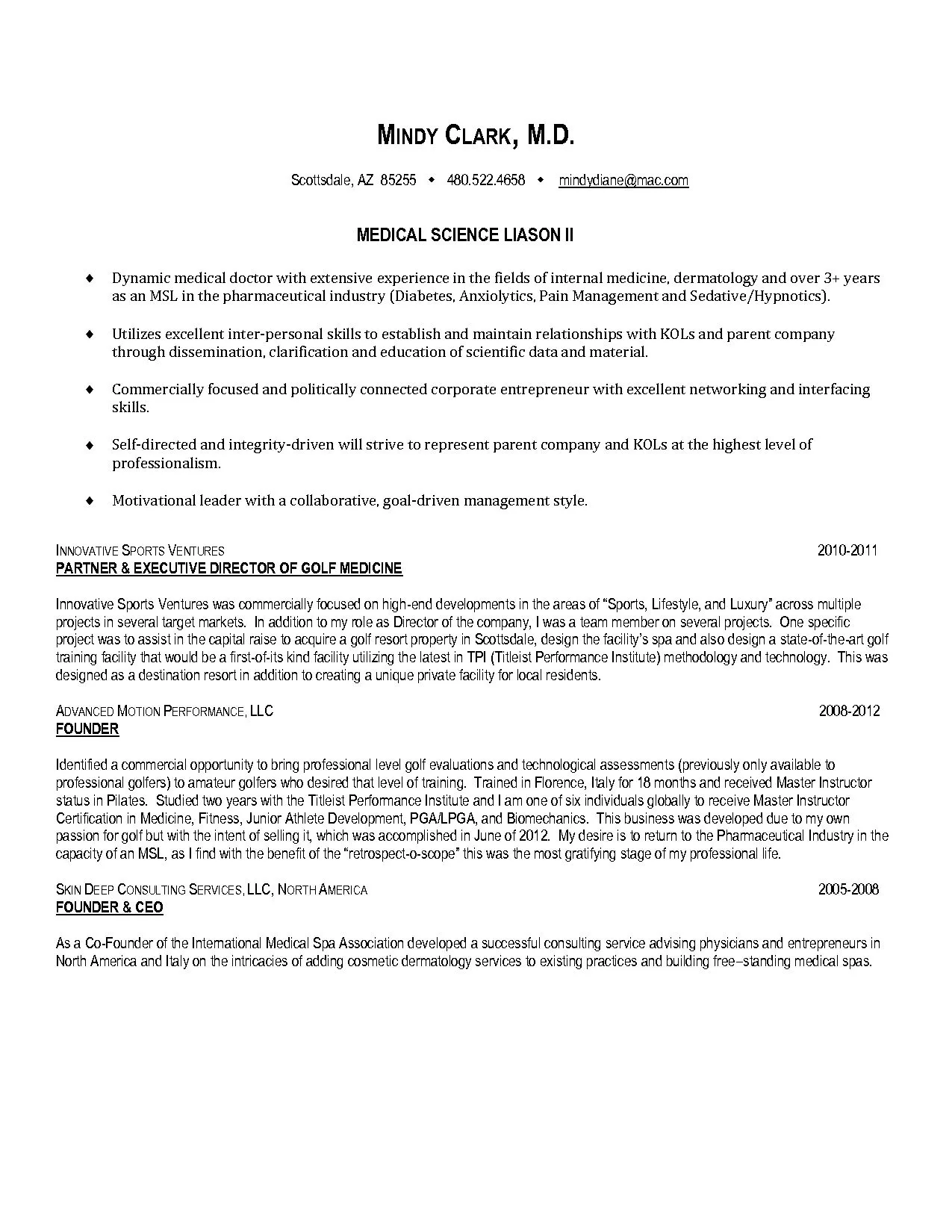
End your cover letter with a clear call to action. Tell the hiring manager what you want them to do next. Request an interview. In your closing paragraph, reiterate your interest in the position and your enthusiasm for the opportunity. Thank the hiring manager for their time and consideration. Then, state that you are eager to discuss your qualifications further and invite them to contact you. Provide your contact information, including your phone number and email address. Making it easy for the hiring manager to contact you is very important. You might say, “I am eager to discuss how my skills and experience can contribute to [Hospital Name]’s mission. Thank you for your time and consideration. I look forward to hearing from you soon. You can reach me at [Phone Number] or [Email Address].” Make your call to action specific and direct. By including a clear call to action, you demonstrate your initiative and increase your chances of getting an interview.
Cover Letter Examples
Reviewing cover letter examples can provide valuable insights into how to structure and write your own cover letter. Search online for cover letter samples for doctors. Look for examples that are tailored to specific medical specialties and job types. Pay attention to the language, format, and style used in these examples. Analyze how other doctors have highlighted their qualifications, skills, and achievements. Use these examples as inspiration, but avoid copying them directly. Tailor your cover letter to your unique background and experiences. Adapt the examples to reflect your own qualifications and the specific requirements of the job you are applying for. Look at samples from different medical specialties and career levels. Use these examples to guide you, but always remember to personalize your cover letter. By reviewing cover letter examples, you can gain a better understanding of best practices and increase your chances of creating a standout cover letter that impresses the hiring manager.
Cover Letter Template Doctor
Creating a cover letter template for doctors can save you time and effort when applying for multiple jobs. Start with a basic template that includes your contact information, the date, and the hiring manager’s contact information. Then, create sections for the opening paragraph, showcasing your qualifications, showcasing your relevant experience, demonstrating your enthusiasm and fit, and the call to action. The template should provide a framework that you can customize for each job application. Fill in the details specific to each position, highlighting relevant skills, experiences, and achievements. Remember to tailor the template to match the job description. Use the template as a starting point. Always adapt it to the specific requirements of each job. Review the template, making sure it is easy to read, well-formatted, and error-free. A cover letter template can streamline your job application process and help you create a professional and effective cover letter.
Key Takeaways for Doctors
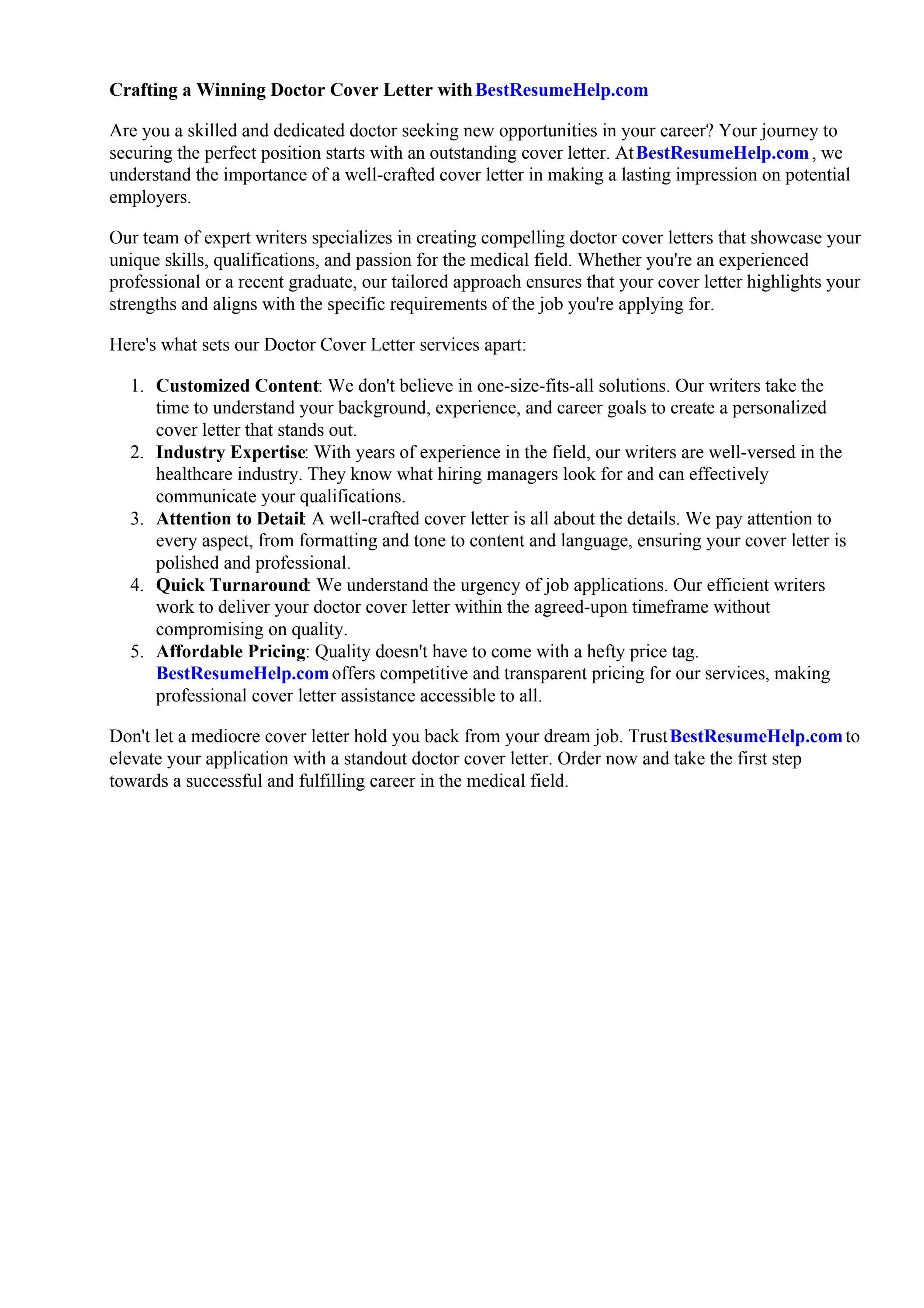
In summary, creating a compelling cover letter is essential for doctors seeking employment. Tailor your cover letter to each job, highlight your qualifications and skills, research the employer, and create a compelling opening. Showcasing relevant experience, quantifying achievements, and addressing the hiring manager directly are crucial. Demonstrate your enthusiasm and fit. Proofread and format your letter carefully, use keywords strategically, and include a clear call to action. Review cover letter examples. Create a template to save time. By following these steps, doctors can craft cover letters that stand out and secure interviews. A strong cover letter is a crucial step in launching or advancing your medical career, so invest the necessary time and effort. Always remember to present yourself as a professional and enthusiastic candidate. The key takeaways include tailoring your letter, quantifying achievements, and showcasing your fit with the organization.
